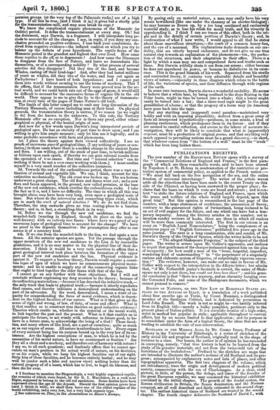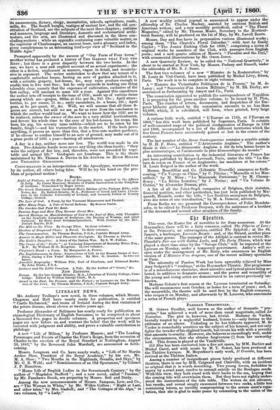PUBLICATIONS RECEIVED.
The new number of the EDINBURGH REVIEW opens with a survey of the "Commercial Relations of England and France," in the first parse graph of which are these remarkable words, said to have been uttered by Napoleon I. at St. Helena in condemnation of the restrictive or pro- tective system of commercial policy, as applied to the French nation :— " We must fall back on the free navigation of the sea, and the entire freedom of universal interchange." The writer of the article waves aside all the objections that have been made to the recent Treaty on this side of the Channel, as having been answered in the proper place; de- clares that the bases on which it rests are broad and secure ; and is con- tent "to stake the future relations of England and France, upon which the peace and welfare of the whole world largely depend, upon this great trial." But this opinion is reconsidered in the last page of the number, with a large abatement of confidence, the annexation of Savoy, contrary to the guaranteed rights of Switzerland, being declared to be an act of evil- augury for the future and one which can have but a tem- porary impunity. Among the literary articles in this number, not to mention sundry reviews of books, there are three in which all readers will be more than commonly interested. The first in our esteem is an essay on " English.Local Nomenclature," being the complement of an ingenious paper on "English Surnames," pub 'shp d five years ago in the same journal. The next is a long examination able and candid, of Mr. Darwin's theory of the Origin of Species, which examination, writer holds to be not proven. "The alleged Shakspeare Forgeries," is the subject of the third paper. The writer is severe upon Mr. Collier's opponents, and inclines to acquit that gentleman of the charges insinuated against him on the plea of incapacity ; for how could 's. man of his "loose, forgetful, imperfect, wandering kind of understanding" be "the perpetrator of a singularly curious and elaborate system of forgeries, of surprisingly vigorous execu- tion ? " The reviewer, however, can make out no ease in favour of Mr. Collier with respect to the interpolation in the Alleyne letter; but admits that, "if Mr. Netherclift junior's facsimile is correct, the name of Shak- speare not only is not there, but would not have been there" ; and his gene- ral conclusion is that "there is a mystery, and an obscurity hanging over the Corrected Folio, and some of the Shakspeare documents, which we cannot pretend to remove."
RIGHTS OF NATIONS, OR THE NEW LAM OF EUROPEAN STATES AP- PLIED TO THE AFFAIRS OF ITALY, is a translation of a work published about four „niontha ago at Turin, by Count Mamiani, a distinguished member of the Sardinian. Cabinet, and is dedicated by permission to Lord John Russell. The work is not as might be—too hastily inferred from its English title—merely a bulky pamphlet, pertinent only to the present phase of Italian politics. It is a scientific treatise of a high order, strict in method but popular in style ; applicable throughout to current affairs, but by no means limited to that application; and its purpose is to consolidate under the form of a logical theory, the ideas that are now tending to establish the rule of non-intervention.
SCOTLAND nv TER MIDDLE AGES, by Mr. Cosine Innes Professor of History in the University of Edinburgh, is a series of sketches of the early social life and progress of Scotland, originally read in the shape of lectures to a class. One lesson, the author is of opinion he has succeeded in conveying, namely, "that true history is best to be learned from the study of its genuine materials, and not from the twice-told tale of the historians of the bookshelves." Prefixed to the sketches are maps that are intended to illustrate the author's notions of old Scotland and its pro- gress; accompanied by explanatory notes and lists of places, and other topographical apparatus. The first two chapters of the volume, which are introductory, trace the origin and development of modern political society, commencing with the era of Charlemagne. As a clear, vivid picture in little, of the person, the doings, and times of the founder of the great European republic, we may commend the historical exhibition contained in the initial chapter. The growth of the feudal system, the Roman civilization in Britain, the Saxon domination, and the Norman conquest, are all well described and fairly estimated in the emend chap- ter. The earliest historical times of Scotland ans treated in the second chapter. The fourth chapter delineates the Scotland of David I., with its amusements, dietary, clergy, monasteries, schools, agriculture, roads, mills, &c. The Scotch burghs vestiges of ancient law, and the old con- stitution of Scotland, are the subjects of the next three chapters; costume and manners, language and literature, domestic and ecclesiastical archi- tecture, and the arts, are illustrated and discussed in the three con- cluding sections : while an appendix containing some valuable matter, as the capitular of Charlemagne, an ancient lease, and a glossary and index, gives completeness to an interesting bird's-eye view of" Scotland in the Middle Ages."
Prompted apparently by the success of "Our Farm of Four Acres," another writer has produced a history of THE GARDEN THAT PAID THE :RENT; but there is a great disparity between the two books. In the one, we have a neat and explicit account of an actual experiment ; the other is a fiction, unpleasant in manner, vague in detail, and inconclu- sive in argument. The writer undertakes to show that any tenant of a comfortable suburban house, having an acre of garden attached to it, with a suitable grapery, hot-house, &c., may raise produce enough to enable him to live rent free ; but he only succeeds in making one thing tolerably clear, namely that the expenses of cultivation, exclusive of the first outlay, will amount to some 451. a year. , Against this expediture the author sets Of receipts to the tune of 1531., made up of various items among which are—grapes, 901ba. at 218. per lb., 94/. 108.; April straw- berries, Is. per ounce, 71. 4s.; early cucumbers, 6s. a brace, 101.; April peas, at 88. per quart, W., &c. Well, we will assume that all these fi- gures are correct, but still we are as far as ever from the conclusion to which the author would lead us. We want to know-how the 153/. are to be realized, unless the owner of the acre be a very skilful horticulturist, and devote his whole time to the care of his hot-houses, his crops, his bees, his pig, his seventy tame rabbits—which are to be eaten by his family, faugh I—and his transactions in the market. If the book prove anything, it proves no more than this, that a first-rate market gardener, if he choose to confine himself to an acre of ground, may make out of it a gross profit of 1081. a year—barring all mischances.
A day is a day, neither more nor less. The world was made in six days. Pre-Adamite fossils were never anything else than fossils ; "they were the subject of fiat law, and, therefore, were not preceded by vege- table and animal -life." Geologists are humbugs. This is the thesis maintained by Mr. Thomas A. Davies in his ArrswEn TO HIT= MILLER AND THEORETIC GEOLOGISTS.
Corrsummeriorr is an interpretation of the Apocalypse, warranted true by its author, all others being false. Will he try his hand on the pro- blem of perpetual motion ?
The Love of God. A Poem, by the Viscount Massereene and Ferritrd. After Many Days. A Tale of Social Reform. By Seneca Smith. The Garden that Paid the Bent.
Famous Boys and How They Became Great Men.
Sacred Musings on Manifestations of God to the Soul of Man, with Thoughts on the Symbolic Language of Scripture, the Destiny of Woman, and other Subjects. Bv Mary Anne Schimmelpenninck. With Preface by the Rev. Joseph Baylee, D.D.
The Mill on the Floss. By George Eliot. In three volumes.
Stretton of Ringwood Chace. A Novel. In three volumes.
The Consummation. By Thomas Hutton, F.G.S., Captain Bengal Army. Answer to Hugh Miller and Theoretic Geologists. By Thomas A. Davies. The Exile's Daughter. A Story of the Italian War. By S. W. Fullom. • The Cruise of the Frolic " ; or Yachting Experiences of Barnaby Brine, Esq.,
R.N. By William H. G. Kingston. In two volumes.
Virginia's Hand : a Poem. By Marguerite A. Power.
The Englishwoman is Italy; Impressions of Life in the Roman States of Sar- dinia, during a Ten Years' Residence. By Mrs. G. Gretton. In two vo- lumes.
Anecdote Biography : William Pitt, Earl of Chatham, and Edmund Burke. By John Timbs, F.S.A.
Leonore and the Little Countess. A Tale. By the Author of Gwen," Re. NEW EDITIONS.
Essays. By the late George Brinkley, M.A., Librarian of Trinity College, Cam- bridge. Edited by William George Clark, M.A.
Israel in the Past, the Present, and the Future ; or Lectures on the Restora-
tion of the Jews. By Thomas Hutton, F.G.S., Captain Bengal Army.
Boons.
Right of Nations, or the New Law of European States applied to the Affairs of Italy. By Count Mamiani, Minister of Public Instruction in the Kingdom of Sardinia. Translated by Roger Acton.
The Greek Testament, from Cardinal Mais Edition of the Vatican Bible, with Notes, Re. By Robert Ornsby, M.A., Professor of Greek and Latin Liters- tare in the Catholic University of Ireland, and formerly Fellow of Trinity College, Oxford.



























 Previous page
Previous page